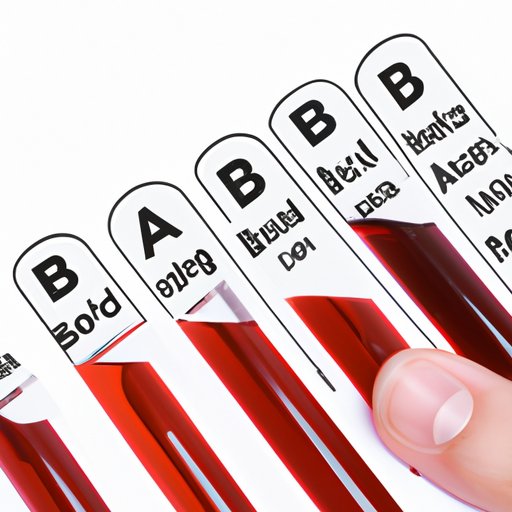
I. Introduction
Knowing your blood type may seem like a small detail, but it can have a big impact on your health and well-being. In this article, we will explore the different ways to determine your blood type, the importance of knowing your blood type, and what your blood type may say about your health. Whether you are preparing for a medical emergency, considering donating blood, or simply curious about your body, this guide will give you the tools to determine and understand your blood type.
II. The Simple Test: How to Determine Your Blood Type at Home
If you are looking for a quick and easy way to determine your blood type, there are at-home tests available for purchase. These tests typically involve a finger prick and a small amount of blood, which is then placed on a test strip. The strip will react differently depending on your blood type, allowing you to determine your blood type at home.
It is important to note that at-home tests may not be as accurate as tests performed by a medical professional. Additionally, these tests may not be able to determine your Rh factor, which is an important detail to know in case of pregnancy or medical emergencies. If you have any concerns about your blood type, it is best to consult with a doctor or medical professional.
III. Why Knowing Your Blood Type is Important: And How to Find Out
Knowing your blood type is important for several reasons. In case of a medical emergency, knowing your blood type can make a difference in receiving the proper treatment. Blood transfusions, surgeries, and other medical procedures may be impacted by your blood type, making it crucial information for medical professionals.
If you are unsure of your blood type, there are several ways to find out. Medical records, such as those kept by your doctor or hospital, may contain your blood type information. You can also request a blood test to determine your blood type.
IV. What Your Blood Type Says About Your Health: A Guide to Understanding
Each blood type has unique traits and characteristics associated with it. Here is a quick guide to what your blood type may say about your health:
Type A:
Those with Type A blood are thought to be more prone to digestive issues, such as acid reflux. They may also have a higher risk of certain types of cancer, such as stomach and pancreatic cancer. However, Type A blood may also be associated with a lower risk of heart disease.
Type B:
Those with Type B blood are thought to be more prone to certain infections, such as E. coli. They may also have a higher risk of developing autoimmune disorders, such as multiple sclerosis. However, Type B blood may also be associated with a lower risk of heart disease.
Type AB:
Those with Type AB blood are thought to have an increased risk of blood clots. They may also be more prone to developing certain conditions, such as kidney disease. However, Type AB blood may also be associated with a lower risk of heart disease.
Type O:
Those with Type O blood are thought to have a lower risk of heart disease, but a higher risk of certain infections, such as malaria. They may also have a higher risk of developing stomach ulcers.
V. From A to AB to O: Understanding the Different Blood Types
There are four main blood types: A, B, AB, and O. Each blood type is determined by the presence or absence of specific antigens on the surface of red blood cells. Here is an overview of the different blood types and their characteristics:
Type A:
Those with Type A blood have A antigens on the surface of their red blood cells. They also have antibodies against Type B blood. This blood type is most commonly found in people of European and African descent.
Type B:
Those with Type B blood have B antigens on the surface of their red blood cells. They also have antibodies against Type A blood. This blood type is most commonly found in people of Asian descent.
Type AB:
Those with Type AB blood have both A and B antigens on the surface of their red blood cells. They do not have antibodies against either blood type. This blood type is relatively rare, and is most commonly found in people of mixed race.
Type O:
Those with Type O blood do not have either A or B antigens on the surface of their red blood cells. They have both antibodies against Type A and B blood. This blood type is most common worldwide.
VI. Discovering Your Blood Type: What You Need to Know Before Donating
If you are considering donating blood, it is important to know your blood type beforehand. This can help ensure that your donation is safe and effective for the recipient. Blood type is typically determined through a blood donation. The blood sample is then tested for blood type and Rh factor.
It is important to note that not everyone is eligible to donate blood. Certain health conditions, medications, and travel history may disqualify you from donating. If you are unsure if you are eligible to donate blood, it is best to consult with a medical professional or blood donation center.

VII. The Genetics Behind Blood Types: Explained for All Ages
Blood type is determined by genetics. Each parent contributes one copy of the gene that determines blood type. There are three different alleles that can be present: A, B, and O.
If both parents have Type O blood, their child will also have Type O blood. If both parents have Type A blood, their child could have Type A or Type O blood. If one parent has Type A blood and the other has Type B blood, their child could have Type A, Type B, AB, or O blood.
VIII. How to Decode Your Blood Type and Optimize Your Nutrition
Some research suggests that your blood type may impact your nutritional needs and digestive health. Here is a quick guide to how your blood type may impact your diet:
Type A:
Those with Type A blood may benefit from a vegetarian diet, as they may have decreased levels of stomach acid and may struggle to digest meat. They may also benefit from some dairy, but should limit their intake of red meat.
Type B:
Those with Type B blood may benefit from a balanced diet that includes plenty of meat, dairy, and vegetables. They should avoid chicken and corn, but can enjoy most other foods in moderation.
Type AB:
Those with Type AB blood may benefit from a diet that is high in seafood, tofu, and dairy. They should avoid caffeine and alcohol, and should limit their intake of red meat and chicken.
Type O:
Those with Type O blood may benefit from a diet that is high in protein and low in grains and dairy. They should eat plenty of meat, fish, and vegetables, but should avoid grains and legumes.
IX. Conclusion
Knowing your blood type may seem like a small detail, but it can have a big impact on your health and well-being. Whether you determine your blood type at home or through a medical professional, understanding your blood type can help you make informed decisions about your health, nutrition, and medical care. We encourage all readers to take action and determine their own blood type, and to consult with a medical professional if they have any concerns.




